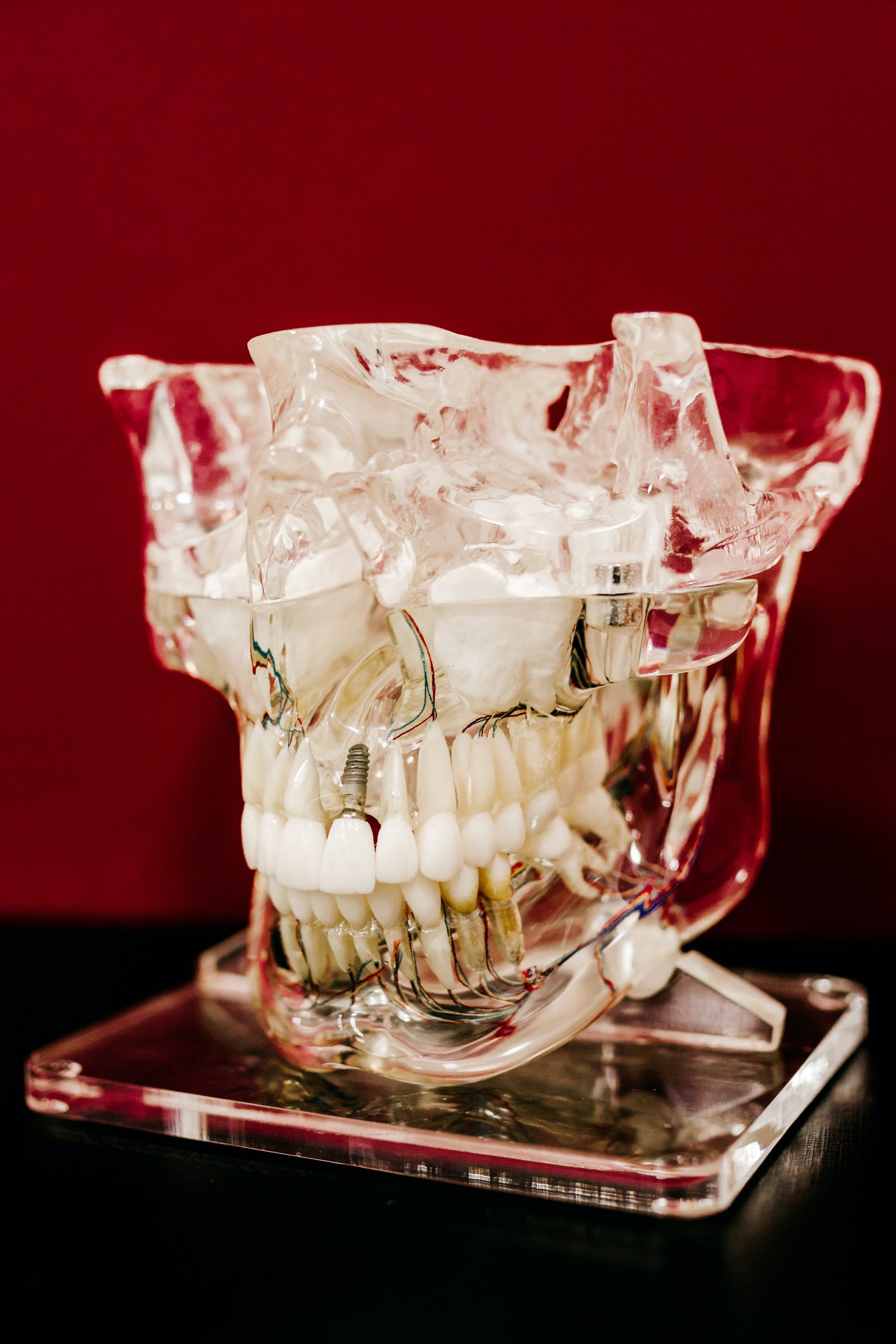Undoubtedly, implant restorations have revolutionized the way teeth can be replaced, Learn why.
If you have lost a tooth due to trauma, injury, or tooth extraction, a single tooth implant in Ottawa presents the best tooth-replacement option that looks and functions much like a natural tooth.
With a single tooth dental implant procedure performed by experienced implant dentists at Rockcliffe Dental & Denture Centre, you can be sure to gain your confidence back and restore both the function and aesthetics of your smile.
What is a Single Tooth Implant?
A single tooth dental implant is a permanent dental solution designed to replace a missing individual tooth and its root. The implant includes an implant post, an abutment, and a crown placed on top of it.
Single-tooth implant restorations require invasive surgery to place a titanium screw into the jawbone where the tooth is missing. This screw then serves as an artificial tooth root to support a crown, which will look and function like your real tooth.
How Do Single Tooth Implants Work?
Single tooth implants act to replace the entire tooth structure, rather than just a crown or a visible portion of the tooth.
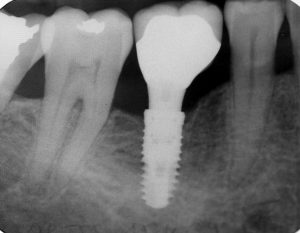 An entire dental implant restoration consists of three main parts:
An entire dental implant restoration consists of three main parts:
- Dental implant. This is a titanium screw-like post that is surgically placed in your jawbone. A dental implant acts to replace a natural tooth root and serve as an anchor to the tooth crown.
- Crown. An implant-retained crown is a custom restoration that mimics the missing tooth in both function and aesthetics.
- Abutment. This is a tiny connector that attaches the crown to the dental implant. Abutments are crucial to ensure a stable foundation for your new tooth.
Single Tooth Implant Procedure
Dental surgery for a single tooth implant usually consists of several stages performed at the dental office, with healing time between surgical procedures.
The process of placing a single tooth implant in Ottawa involves the following steps:
- Removal of the damaged or decayed tooth, if necessary
- Jawbone preparation and bone grafting in case of poor bone quantity
- Dental implant placement procedure
- Healing and bone growth around the implant
- Abutment placement
- Artificial tooth crown placement
The entire dental implant process can take several months from start to finish. A large portion of that time is crucial to allow for healing inside of your mouth and bone growth in your jaw. Depending on your specific situation and the type of procedure done, some steps can sometimes be combined.
When Are Single Tooth Implants Used?
To be considered a good candidate for dental implants, it is important that your jawbone is strong enough to support the implant and withstand the pressure that will be placed on the crown once the procedure is completed. In addition, the overall oral health, including nearby teeth and soft tissues, needs to be in good condition.
Prior to the implant procedure, Dr. Koniouchine will conduct a thorough exam and review of your medical history to develop a custom treatment plan. In case you don’t have adequate bone to hold the implant, the dentist can add synthetic bone through bone grafting. If you are suffering from periodontal disease, he will discuss the treatment options to address the issue prior to the implant treatment.
Unfortunately, some medical conditions could eliminate a candidate for a dental implant. These problems include liver disease, diabetes, and a severe bleeding disorder.
Single Dental Implant Variables
The treatment protocol for replacement teeth can differ significantly based on the specific tooth being replaced and its anatomy.
- One-phase protocol. If the tooth being replaced has a single root and is not infected, the dental implant placement can be completed at the same time as the tooth is removed.
- Two-phase protocol. Molars have two or three roots and usually require a bone graft after the tooth is extracted. The bone graft is then allowed to heal for up to 3 months before the replacement tooth can be surgically placed in the second phase.
A single tooth dental implant procedure also varies between the lower and the upper jaw due to considerable anatomic differences.
Lower Jaw – “Mandible”
The back teeth in the lower jaw are located right above the mandibular nerve. As such, it is important to make sure that the implant isn’t located too close to disturb the mandibular nerve. A panoramic X-ray can help with pre-surgical planning to minimize the possibility of failure or complications.
The treatment time for lower jaw implants can last anywhere between 2 to 6 months.
Upper Jaw – “Maxilla”
The location of the Maxillary sinus limits the upper jawbone for the back teeth. After an upper tooth is lost, there may not be sufficient bone to place an implant. In that case, the bone can be added through the procedure called “sinus lift bone graft”. This can be done either at the time of the implant surgery or as a separate surgical procedure.
The treatment time for upper jaw implants can range between 4 and 12 months.
Single Back Tooth Implant
Replacing a single back tooth is the most common dental implant procedure, as premolars and molars are usually the first teeth suffering from gum disease and dental decay.
Dr. Koniouchine at Rockcliffe Dental & Denture Centre has successfully replaced countless single back teeth. Back tooth replacement is a highly predictable dental procedure with a great success rate.
According to research, first molars perform 80% of chewing. Therefore, replacing first molars is a high-priority treatment to maintain full function, both with jaw stability and bite.
Second molars, on the other hand, are not as crucial for good function, – in many cases, they don’t require replacement, unless the patient feels that they need additional chewing surface.
Single Front Tooth Implant
Replacing a single front tooth can present its own challenges associated with the high visibility of the dental prosthetic when smiling.
Often, the determining factors of the successful front tooth replacement are:
- The level of expectation that the patients have that the new tooth will look indistinguishable from natural teeth around it
- The prominence the new tooth has in the smile
Luckily, an experienced dental implant dentist in Ottawa will be able to create a natural-looking custom crown that will help to restore both the smile and the confidence of the patient.
Dental implant posts come in various dimensions of width and length. As front teeth are used for tearing food, it is preferred to use an implant of the maximum size. Through a thorough examination prior to the oral surgery procedure, the dental implant dentist or oral surgeon will be able to decide on just the right size of the metal post to support the new tooth.
Healing Time for a Dental Implant
The time for healing between the placement of an implant and the final crown is usually shorter for lower jaw implants as compared to the upper jaw.
The lower jaw contains denser bone, which allows for faster osseointegration or fusing of the bone with the implant post. Typically, crowns for lower tooth implants can be placed in under 10 weeks from the surgical placement of the implant. An upper back tooth implant, on the other hand, would take at least 16 weeks to osseointegrate.
Your Options for Tooth Replacement
Generally, you have two options for replacing individual teeth: fixed bridges and dental implants. While fixed bridges have been offering a great tooth replacement option for many years, dental implants gain more and more popularity for permanent tooth replacement.
Single Tooth Replacement Bridge vs. Implant-Supported Restorations
- Dental bridges. A tooth-supported fixed bridge presents multiple crowns fused together. The crowns on the edges of the bridge are hollow in order to fit exactly on top of the surrounding healthy teeth. The crown in the middle (a “pontic”) acts to fill the gap in your teeth. In order to place a dental bridge, the dentist will need to file down the adjacent teeth to allow for the end crowns to fit over them.
- Dental implants. With dental implants, surrounding teeth do not act as anchors, and a titanium post acts as a root replacement instead. After the placement of the implant in the jawbone, the gum tissues need to heal around it. Finally, a natural-looking dental crown is used to restore the tooth. If you are missing more than one tooth, an implant-supported bridge may be the right option for you.
The Benefits of Choosing Single Tooth Implants
Single tooth implants present the best option for tooth replacement available to date.
Just a few benefits of choosing single tooth dental implants over bridges include:
- Long-lasting. Dental bridges usually require replacement after approximately 10 years of use. Dental implants, on the other hand, can last up to a lifetime when properly maintained.
- Self-supporting. In order to place dental bridges, the dentist has to remove the enamel on the neighboring teeth in order to use them as a stable foundation for the bridge. On the other hand, a dental implant surgery allows you to retain the natural surrounding teeth. In addition, placement of a titanium post in the jawbone prevents gradual bone loss that occurs when a tooth or teeth is missing.
- Aesthetically-pleasing. With dental implants, you are actually replacing the root of the tooth. This means that you are replicating the missing natural tooth in the most efficient way possible.
- Easy to maintain. When you have dental implants, you can brush and floss your teeth nearly the same way as with natural teeth. Bridges, on the other hand, can trap food particles and be difficult to clean and take care of.
Contact Rockcliffe Dental & Denture Centre for Single Tooth Replacement Options in Ottawa
Single tooth implants in Ottawa present one of the best ways to replace an individual tooth and restore the appearance of your natural smile. Whether you have experienced tooth loss as a result of injury, gum disease, severe tooth decay, or a genetic condition, you don’t have to go about your life with a gap in your smile.
Give us a call today to learn more about single tooth restoration options and receive professional care from skilled dental surgeons.
Single Tooth Implant FAQ
A dental plan will custom design an implant crown to match your bite and opposing natural teeth. The goal with an implant-supported crown is to have the tooth blend in with the adjacent teeth so that the majority of people will never be able to recognize an implant crown.
At Rockcliffe Dental & Denture Centre, our team of implant dentists will ensure that you are satisfied with the final outcome of your tooth replacement procedure.
A single implant can cost from $3,800 per implant and crown, but the cost can vary depending on your specific situation, implant type and position, and whether the dentist performs additional treatments like bone grafting. For example, if the dentist places two or more implants are at the same time, the cost per single tooth implant will be $3,800.
The entire process of getting a tooth implant from beginning to end can last anywhere between 6 to 12 months. Most of that time is required for allowing your jawbone to heal between the procedures.
A single tooth implant procedure is not painful, as your dentist will apply local anesthesia prior to the treatment. At Rockcliffe Dental & Denture Centre, we also offer several dental sedation options to make your experience as pleasant as possible.
After the surgical placement of a dental implant, you may experience some mild pain or discomfort, which can be managed with over-the-counter pain medications and cold compresses. You would also need to follow a specific post-surgery diet for some time.
The main downside of a single tooth implant is that it is a lengthy and costly procedure, and insurance doesn’t fully cover it. However, it is important to remember that you are investing in a permanent solution that can last you a lifetime with proper maintenance.
Dental implants are definitely worth all the trouble! Due to their durability, functionality, and appearance, single tooth implants present the best long-term solution for replacing a missing tooth.
Dental Implants Before and After Pictures
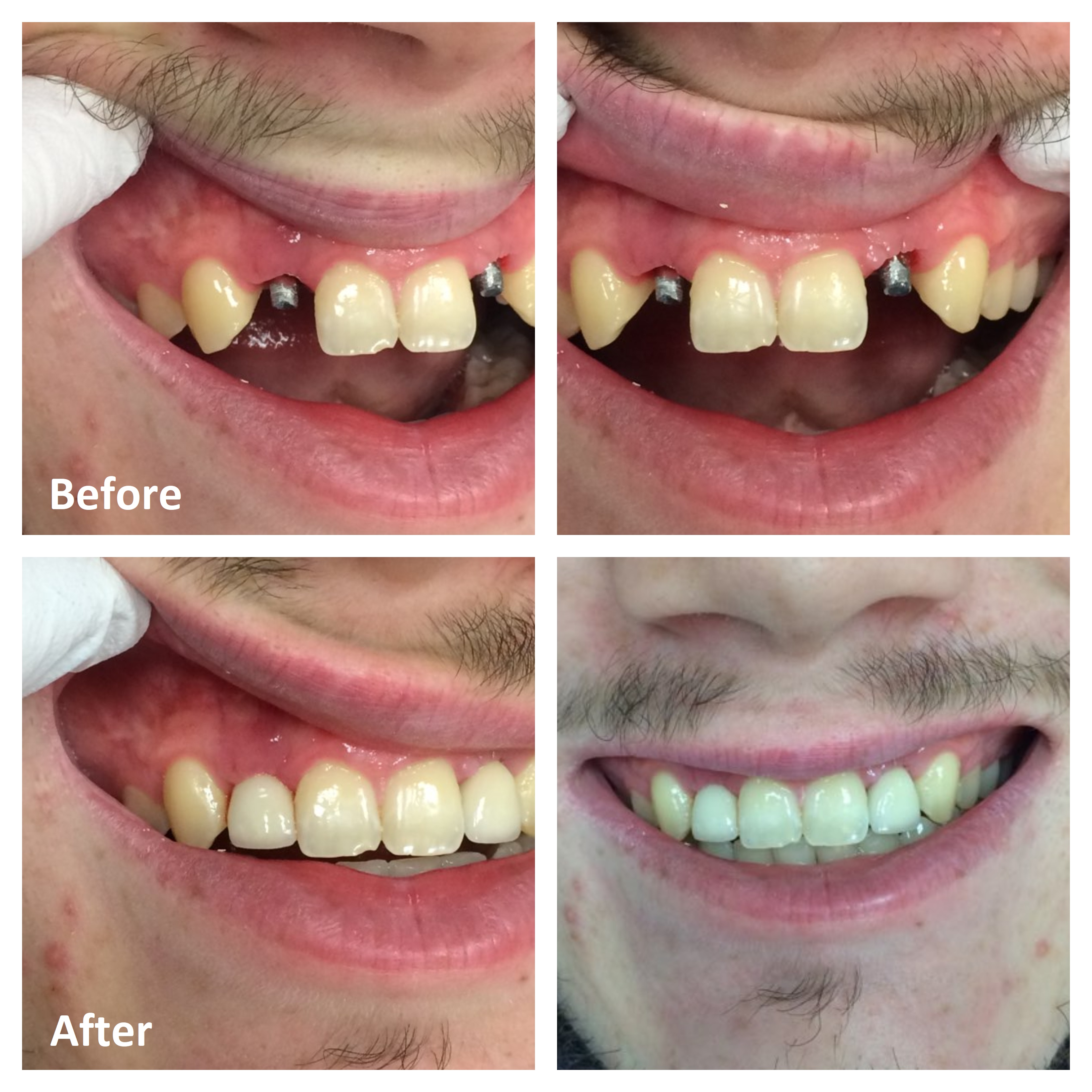
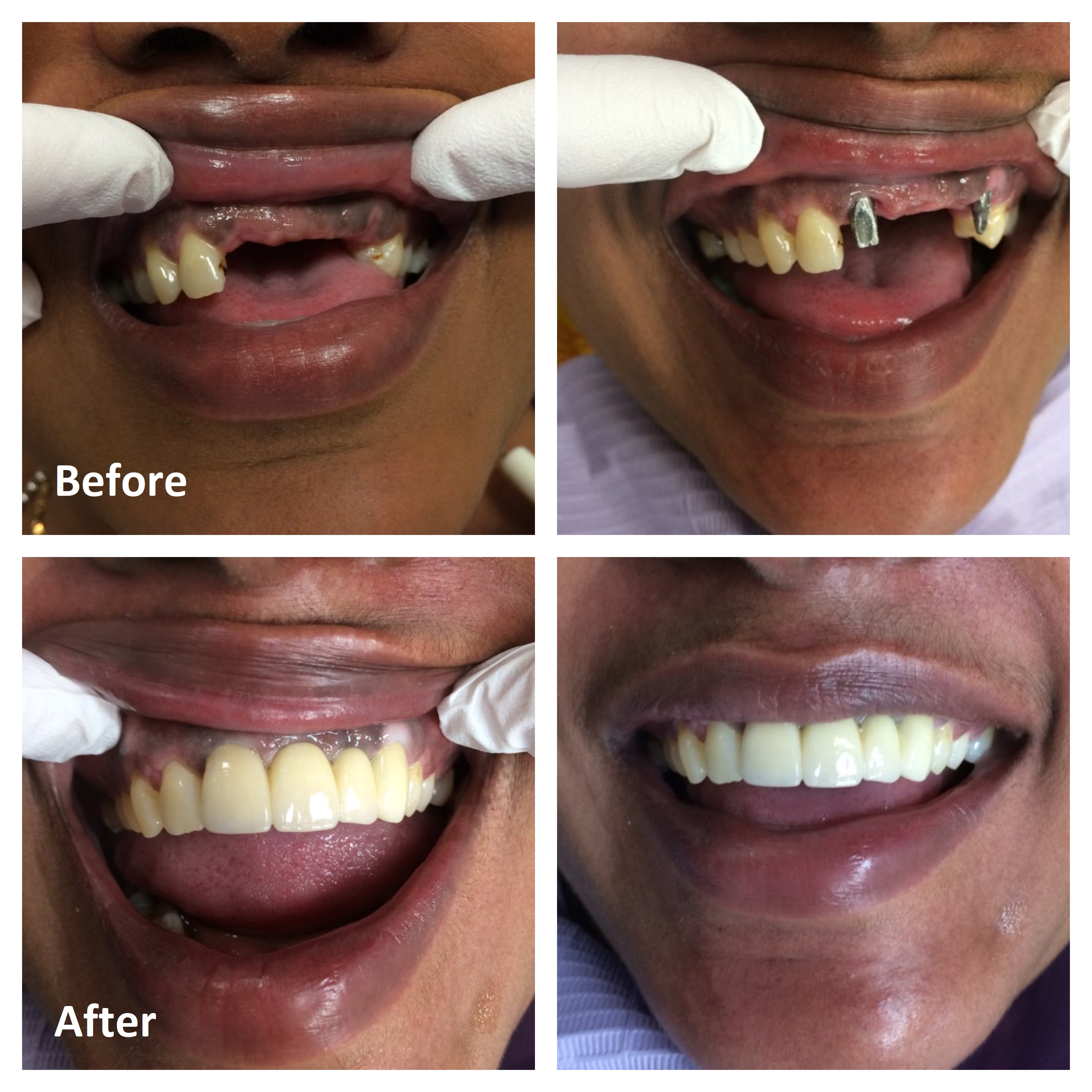
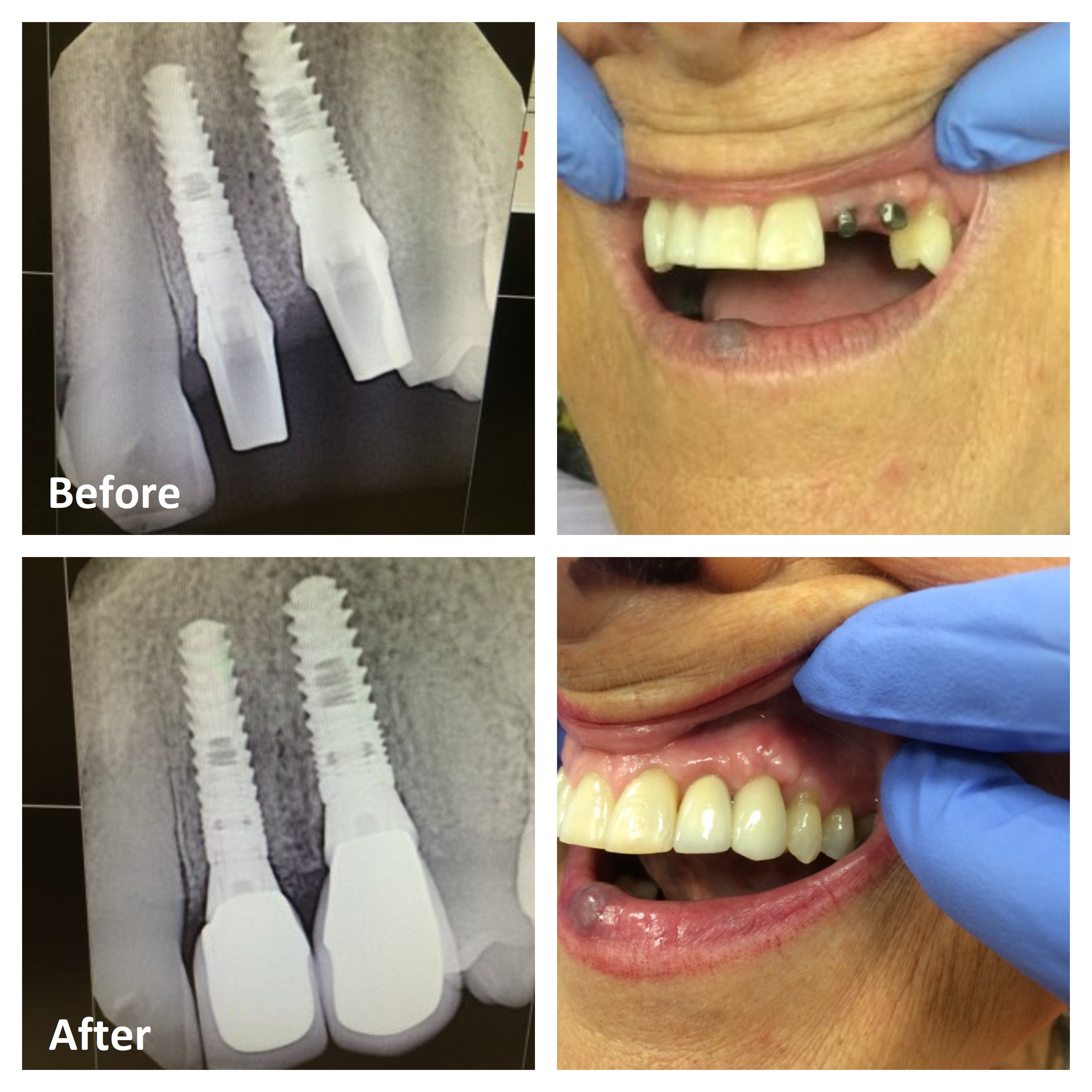
Read More:
